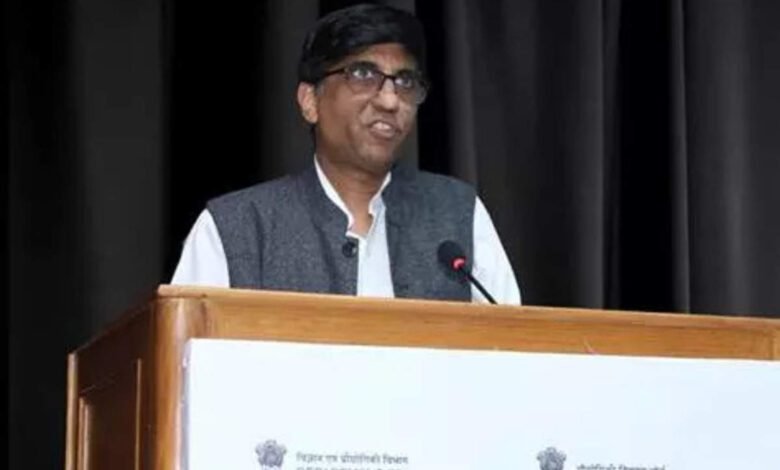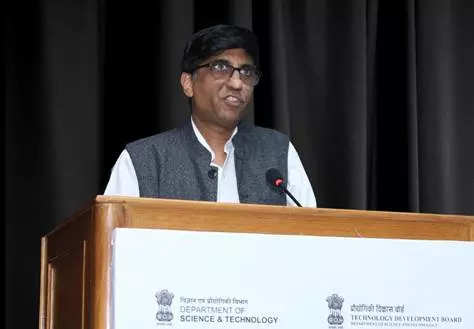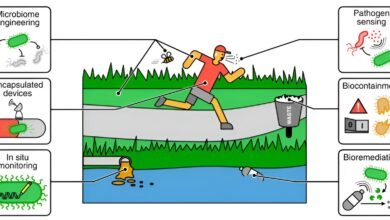Integrating technology into policy frameworks is key to driving progress: DST Secretary, ET EnergyWorld

 Prof Abhay Karandikar, Secretary, DST, speaks on National Technology Day 2024, celebrated in New Delhi on Saturday.
Prof Abhay Karandikar, Secretary, DST, speaks on National Technology Day 2024, celebrated in New Delhi on Saturday.The Technology Development Board (TDB) of the Department of Science and Technology celebrated National Technology Day 2024 on May 11 at INSA Auditorium, ITO, New Delhi.
The event, titled “Advancing Clean and Green Technologies for a Sustainable Future”, witnessed the convergence of eminent scientists, dignitaries and thought leaders, with the aim of charting a path to a cleaner, greener and more resilient nation.
Ajay Kumar Sood, Principal Scientific Advisor to the Government of India, emphasized the promotion of electric vehicles (EVs) through initiatives such as the National Electric Mobility Mission Plan (NEMMP) and Faster Adoption and Manufacturing of Hybrid and Electric Vehicles (FAME ), aiming to mitigate greenhouse gas emissions. He highlighted the EV Mission, led by the Prime Minister’s Science, Technology and Innovation Advisory Council (PM-STIAC), dedicated to developing standards and support structures for EV adoption.
Sood further underlined the strategic importance of the National Hydrogen Mission in India’s journey towards a net zero target by 2070. He emphasized substantial investments in green hydrogen production as a key component of this mission. Professor Sood also highlighted ongoing efforts in carbon capture, utilization and storage (CCUS) technologies, with policies aimed at cost optimization and broader industrial application, further contributing to India’s sustainability goals.
Professor Sood highlighted the importance of advisory groups and international collaborations, such as OPSA’s partnership with the Rocky Mountain Institute (RMI) on zero-emission road transport, in improving India’s technology frameworks and policies for sustainable development and meeting of international climate goals.
The Prof. Abhay Karandikar, Secretary, DST underlined the importance of innovation for national development, emphasizing the need to promote a culture of innovation and provide opportunities for individuals to contribute to the progress of the nation. He highlighted the government’s initiatives in funding various research and development programs and encouraging innovation through schemes like NIDHI and TDB, aimed at incubating startups and promoting entrepreneurship. In his speech, Prof. Karandikar emphasized DST’s key role in supporting research and development in sustainable sectors, particularly in clean and green technologies such as water treatment and electric vehicles (EV). He highlighted the significant investments made in these programs and highlighted TDB’s pioneering efforts in supporting startups and MSMEs in the clean and green energy sector. Karandikar highlighted the importance of integrating technology into policy frameworks to drive progress, highlighting collaborations with sectoral ministries and their transition towards sustainability objectives. With a vision of achieving net-zero carbon emissions by 2070, he expressed aspirations for India to become a global leader in sustainability efforts.
The main speech by Prof. Padmashri GD Yadav championed sustainable solutions, advocating carbon removal and technological innovations to reach net zero by 2070. He highlighted the potential of white hydrogen and the future promise of green hydrogen. Propose factories that generate wealth, plastic hydrogenation and battery recycling as paths to sustainable innovation.
Rajesh Kumar Pathak, Secretary of TDB, highlighted the key projects funded by TDB, highlighting the critical role of these technologies in promoting environmental management.
Professor Ashutosh Sharma, President of INSA and former Secretary of DST, highlighted the critical role of technology in achieving sustainability goals, urging policymakers and stakeholders to prioritize it. He said: “Technology is a double-edged sword: it reduces inefficiency, but it can also drive increased consumption. To combat this, focus on electric vehicles, green hydrogen, carbon capture and energy-efficient habitats. The transition for renewable energy around the world is essential to address climate change. Let’s ensure technology serves sustainability.”
The event also saw the participation of 23 students, representing 20 projects selected to compete at the prestigious Regeneron International Science and Engineering Fair (ISEF). Among 140 students across the country who presented 100 innovative projects, these finalists secured a coveted spot to represent India at the Regeneron ISEF from May 11-17, 2024, in Los Angeles, California, USA. Regeneron ISEF, known as the world’s largest pre-college science fair, brings together more than 1,600 young science enthusiasts from more than 60 countries, promoting the exchange of ideas and showcasing cutting-edge science. Often dubbed the “Science Fair Olympics,” the event serves as a platform for young minds to shine on the global stage.





